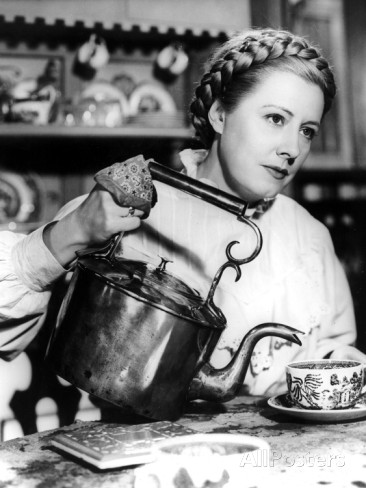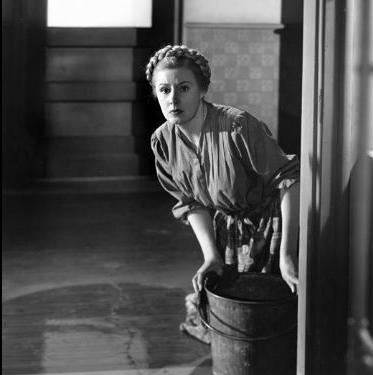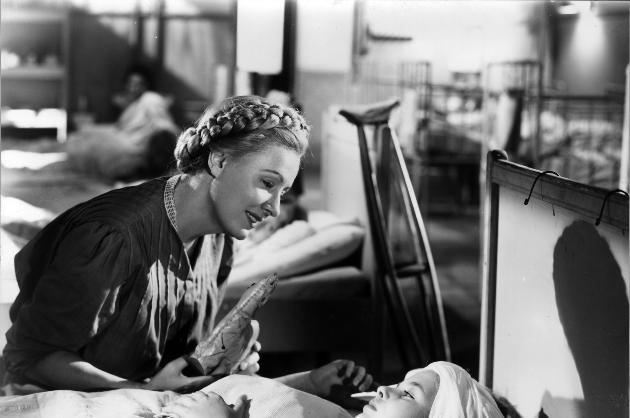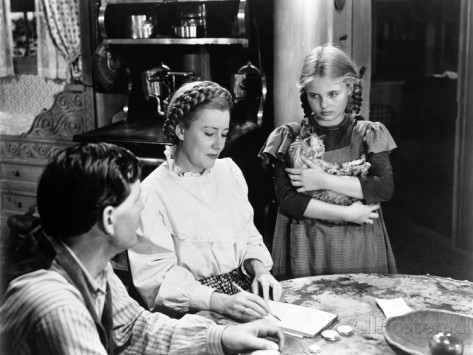Based on the Broadway hit play by John Van Druten (which ran for 20 months in New York), George Stevens’ “I Remember Mama” is a nostalgic and sentimental piece of memorabilia that’s nonetheless precisely directed and emotionally effective.

DeWitt Bodeen screenplay is faithful adaptation of Van Druten play, taken from “Mama’s Bank Account,” based on Kathryn Forbes’s collection of autobiographical short stories.
Like the book and the play, the plotless narrative strings together a series of events and incidents that define the daily lives of a Norwegian family in San Francisco in the early 1900s.

The Hanson clan revolves around its matriarch, Mama Martha Hanson (Irene Dunne), who’s patient, wise, understanding, and affectionate. Guiding the family safely through the ups and downs of existence, she wrestles with the modest budget, gently prods her easy-going husband (Philip Dorn), engineers the wedding of a shy dowdy aunt (Ellen Corby), takes care of her old uncle, encourages her daughter to become a writer, and is patient with a family boarder, who pays no bills but can read Shakespeare.
Mama Hanson is meant to be a symbol of all mothers, a stalwart woman steering her brood through all of its problems, big and small. Presiding over the family, Mama is generous but thrifty, so that “we do not have to go the bank.” She never stops talking of her bank account, which exists only in her imagination.

The story is told in flashbacks by the teen-age daughter Katrin (Barbara Bel Geddes), who serves as the observer- commentator in depicting a series of domestic crises and minor tragedies.
Mama helps Katrin get started as a writer, and Katrin’s coming of age is symbolized by the ritual of granting her her first cup of coffee.
The family is uniquely welded together by ties of affection. The story is meant to represent the struggles and vicissitudes which beset, and also enliven, immigrant life in America as a melting pot and upwardly mobile society that cherishes hard work and honesty. While the older generation clings to its customs and habits of speech, the children are quickly assimilated.

“I Remember Mama” is re-enacted through Katrin’s eyes and from her subjective POV. Having become a successful author, largely due to her mother’s encouragement, she sets down in writing the everyday incidents and vagaries. In fact, Mama lives in the memory of the children after they have grown up more vividly than she had in her own lifetime
Irene Dunne considered Mama Hanson as one of the most demanding roles of her career, for which she was rewarded with her fifth Oscar nomination.
Barbara Bel Geddes also excels as Katrin, a 15-year-old schoolgirl, who matures into an authoress in a sensitive portrait of adolescence. Ellen Corby plays well one of the three aunts from the old country. Oscar Homolka reprises successfully his stage role of the roaring, good-hearted uncle.
Oscar Nominations: 5
Actress: Irene Dunne
Supporting Actress: Barbara Bel Geddes
Supporting Actress: Ellen Corby
Supporting Actor: Oscar Homolka
Cinematography (b/w): Nicholas Musuraca
Oscar Awards: None
Oscar Context:
The winner of the Best Actress Oscar was Jane Wyman for “Johnny Belinda.” This was the fifth and last Oscar nomination of Irene Dunne, who had never won a competitive Oscar. It was also one of her last pictures before retiring from the screen in 1952.
Claire Trevor won the Supporting Actress Oscar (at her second nomination) for “Key Largo,” directed by John Huston. Huston also directed that year ”The Treasure of the Sierra Madre,” for which his father, Walter Huston, received the Supporting Actor.
William Daniels was honored with the Cinematography Oscar for the noir film, “The Naked City.”
Running Time: 134 Minutes



